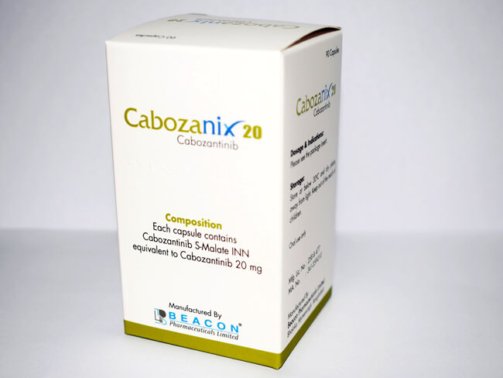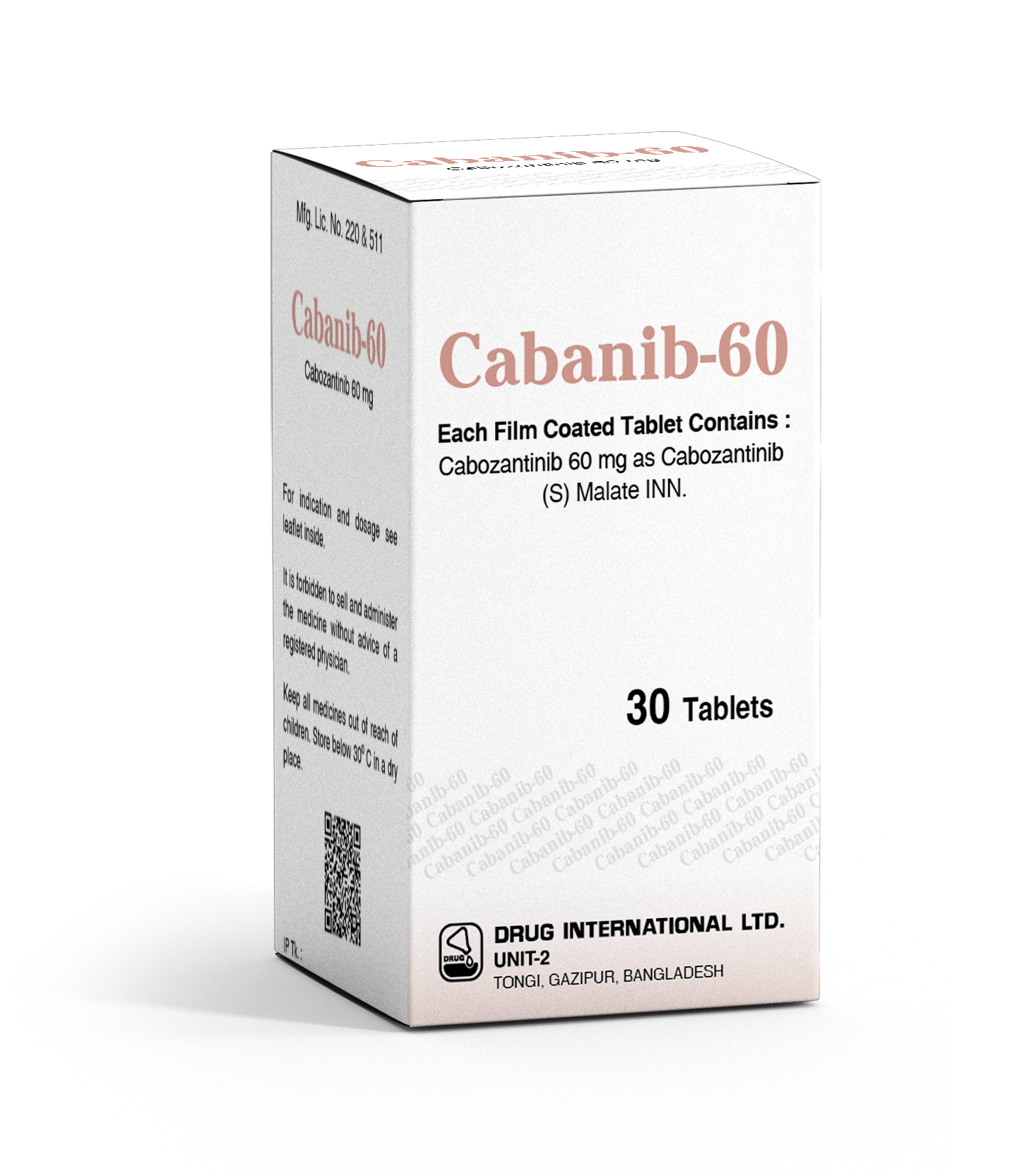Cabozantinib 60mg (Cabometyx)
0.00$
CABANIB capsules comprise 60mg of Cabozantinib as the active component. Cabozantinib is categorized as a tyrosine kinase inhibitor, predominantly employed in oncology to address diverse cancer types. Its mechanism involves directing particular enzymes crucial for cancer cell proliferation and dissemination. Healthcare providers prescribe CABANIB capsules as an integral component of treatment for qualifying patients with specific cancer types.
- Fatigue
- Diarrhea
- Nausea and vomiting
- Decreased appetite
- Weight loss
- Hypertension (high blood pressure)
- Hand-foot syndrome (redness, swelling, and pain in the palms and soles)
Cabozantinib is a tyrosine kinase inhibitor (TKI), a targeted cancer treatment drug. Medullary thyroid cancer (MTC), hepatocellular carcinoma (HCC), and advanced renal cell carcinoma (RCC) are its main uses. A usual prescription dosage of 60 mg is given orally as tablets to suppress many receptor tyrosine kinases involved in tumor growth, angiogenesis (the production of blood vessels), and the spread of tumors.
Mechanism of Action
Cabozantinib functions by inhibiting a number of tyrosine kinases, which are necessary for the survival and growth of cancer cells. It specifically targets the kinases MET, VEGFR, and AXL, which are important for the growth and spread of tumors. The medication slows or stops tumor growth by blocking these routes, which also cuts off the tumor’s blood supply, depriving it of vital nutrients.
Indications and Usage
Cabozantinib 60mg is prescribed for:
Advanced Renal Cell Carcinoma (RCC): Applied as a monotherapy or as a first- or second-line treatment in conjunction with immunotherapy.
Patients with hepatocellular carcinoma (HCC) who have already received sorafenib are eligible.
When the malignancy is advanced, incurable, or metastatic, it is referred to as medullary thyroid carcinoma (MTC).
It is taken once daily on an empty stomach (at least one hour before or two hours after a meal) to maximize absorption.
Dosage and Administration
For adults, 60 mg once daily is the usual suggested dosage. However, based on liver function, patient tolerance, and co-occurring drugs, dosage changes can be required. If the adverse effects are severe, the dosage can be lowered to 20 mg or 40 mg.
Side Effects
Common side effects of Cabozantinib include:
Serious but less common side effects include liver toxicity, gastrointestinal perforation, hemorrhage, and blood clotting disorders.
Precautions and Warnings
Cabozantinib should be used cautiously in patients with a history of cardiovascular illness, liver disease, or bleeding disorders.
Due to the possibility of harm to the fetus or baby, women who are pregnant or nursing should not take this drug.
It might interfere with other drugs, such as potent CYP3A4 inducers and inhibitors.
Conclusion
Cabozantinib 60mg is a successful treatment for a number of advanced cancer types. But because it can have negative effects, it needs to be closely watched. In order to minimize risks and achieve the greatest results, patients should carefully follow their healthcare provider’s instructions.
Order Now At Mdx Pharma bd….
To order from MDX Pharma BD, visit their website at https://mdxpharmabd.com, where you can browse products and place orders online. For inquiries or orders via email, contact emedicarepharma@gmail.com. Alternatively, call (+88) 01929123476. Their address is 29, Abdullahpur, Uttara, Dhaka-1230, Bangladesh.
1. Which foods are off limits when taking cabozantinib?
It is recommended to take cabotanzantinib empty-handed, either one hour before or two hours after eating. Unless your doctor instructs you otherwise, avoid consuming grapefruit, grapefruit juice, or any supplements containing grapefruit extract while taking cabozantinib.
2. How long does cabozantinib treatment last?
Treatment with cabozantinib lasted 6.0 (0.3-30.5) months on average. At least one dose decrease was experienced by two-thirds (n = 66) of the patients; 57 (86.4%) had one reduction and 9 (13.6%) had two.
3. What adverse effects might cabozantinib cause?
Weight loss, nausea, stomatitis, hand-foot syndrome, diarrhea, exhaustion, and high blood pressure are the most common adverse effects (AEs). The safety profile of cabozantinib in patients with RCC is compiled in this article, along with recommendations for handling these adverse events.
4. What is cabozantinib known by another name?
A medication used either by itself or in combination with other medications under the brand names Cabometyx and Cometriq to treat specific forms of medullary thyroid cancer, hepatocellular carcinoma (a type of liver cancer), and renal cell carcinoma (a type of kidney cancer).
| Product Name | CABANIB |
|---|---|
| Generic Name | Cabozantinib |
| Formulation | Capsule |
| Available Pack Size | 30's |
| Available Strength | 60Mg |
Related Products



 Cart is empty
Cart is empty 

